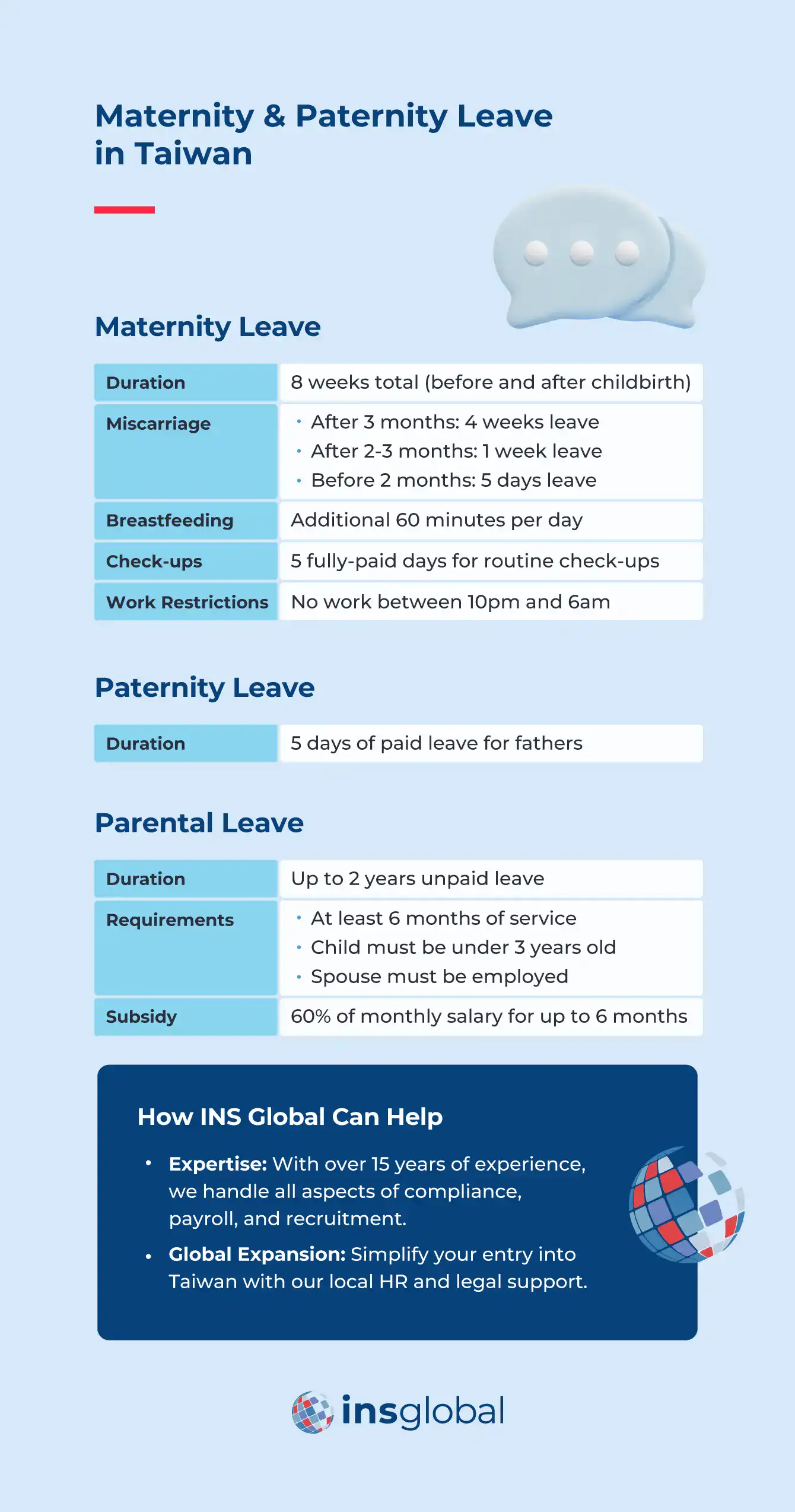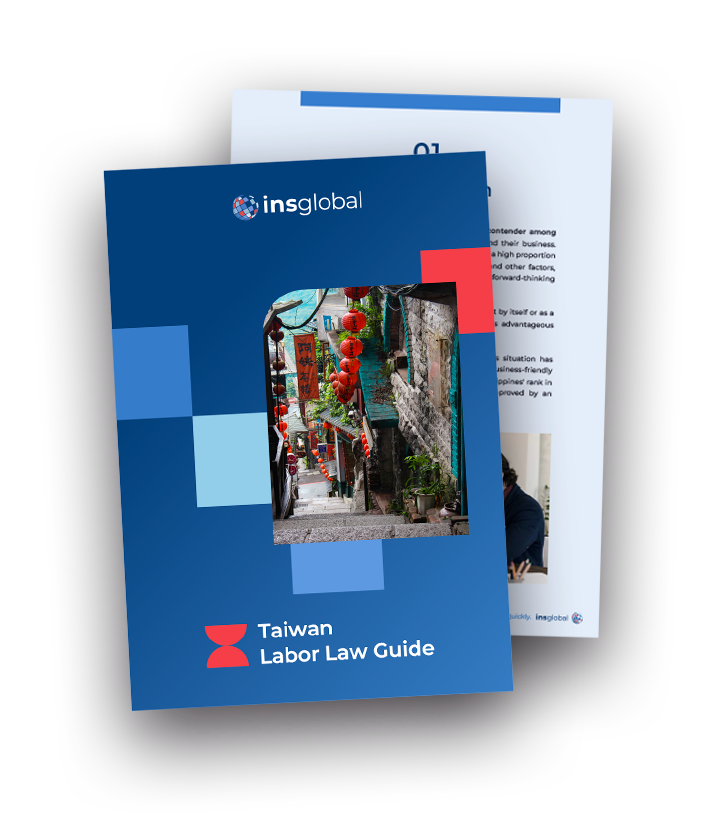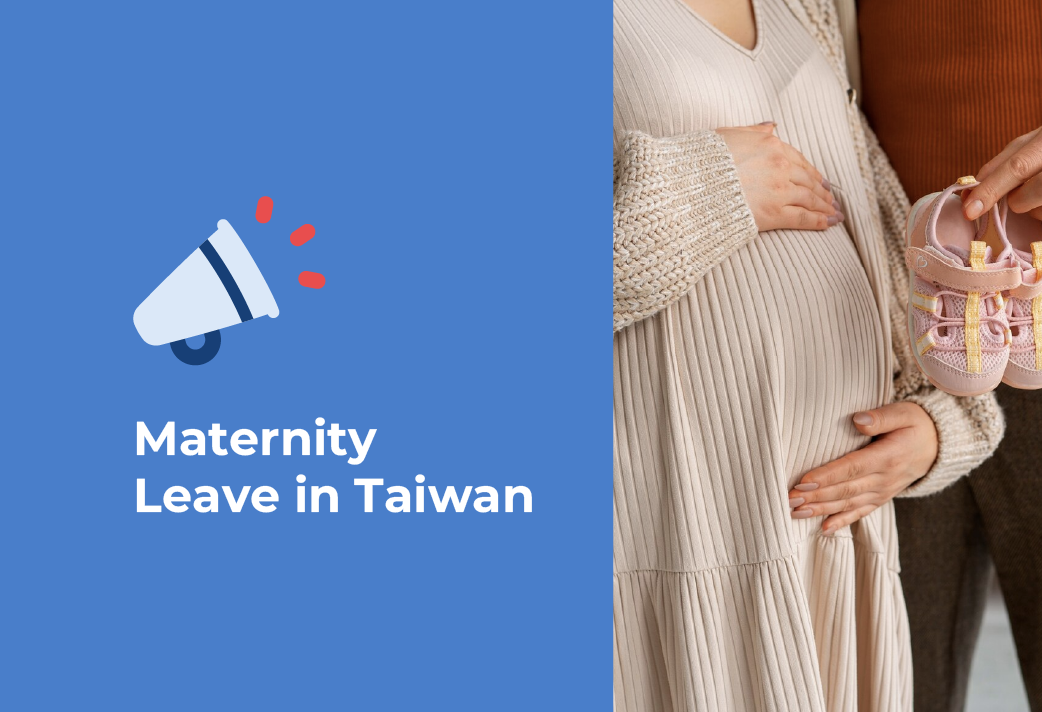The Labor Standards Act (LSA) is the fundamental employment law in Taiwan and includes the statutory rights of parents. In this guide, we cover these rights including maternity, paternity and other relevant leave types.

Tired of scrolling? Download a PDF version for easier offline reading and sharing with coworkers

What You Need to Know About Maternity & Paternity Leave in Taiwan
According to the Article 50 of the LSA, pregnant female employees are entitled to a total combined period of 8 weeks of maternity leave, before and after childbirth. In the months preceding childbirth, female workers can apply to be transferred to lighter work without a reduction in salary.
- In the case of a miscarriage after three months of being pregnant, the female employee shall be permitted to suspend work and take four weeks’ maternity leave.
- If a female employee experiences a miscarriage after having been pregnant for more than two months but less than three months, the female employee is entitled to discontinue work and take maternity leave for one week.
- In the case of a miscarriage after being pregnant for less than two months, the female employee shall be permitted to stop working and take maternity leave for five days.
Under the Act of Gender Equality in Employment, breastfeeding employees are entitled to an extra 60 minutes per day, in addition to regular rest periods, for breastfeeding or breastmilk collection. For overtime in excess of 1 hour, employers shall provide the employee an additional 30 minutes for breastfeeding or breastmilk collection. These breaks are considered as part of the employee’s normal working hours. Pregnant or breastfeeding employees are prohibited from working between the hours of 10pm and 6am.
Pregnant employees must be granted at least five (5) fully-paid days of leave for routine check-ups. The LSA prohibits the termination of employment contracts during maternity leave.
Check Our Taiwan Labor Law Guide
Learn how the Taiwanese law is applied in all aspects and situations, from an employer and employee perspective


How is Maternity Leave in Taiwan Calculated?
Statutory maternity leave in Taiwan is paid as follows:
- Employees with at least six months’ service: 8 weeks’ fully paid maternity leave
- Employees with less than six months’ service: 8 weeks’ maternity leave at half-pay.

Paternity Leave in Taiwan
A male employee is entitled to five days of paid paternity leave when the mother of his child gives birth.
- Employees with at least six months’ service: 8 weeks’ fully paid maternity leave
- Employees with less than six months’ service: 8 weeks’ maternity leave at half-pay.
Parental Leave in Taiwan
Parental leave is a maximum of two years of unpaid leave, granted to mothers and fathers in Taiwan, provided that:
- The employee has worked for the employer for at least six months;
- The child is under the age of three years old; and
- The employee’s spouse is also employed.
Parents can apply for a subsidy during this time through the government’s Employment Insurance Parental Leave Allowance which provides on a monthly basis, 60% of the insured person’s average monthly insurance salary in the six months preceding the leave. Employees can receive this allowance for up to six months during the two years’ parental leave.
How INS Global Can Help
Setting up in a new market involves a great deal of different management and organization skills. You want to ensure that your employees are satisfied with their working conditions. But more than this productive, and secure employees bring your company closer to its market goals.
INS Global understands the complexities and challenges of overseas expansion, and we are here to facilitate your experience and make it easier, faster, and risk-free.
With over 15 years of experience partnering with companies worldwide, INS is uniquely skilled in global HR services and meeting your payroll and recruitment needs.
Our legal advisors can take care of all aspects of compliance and local labor laws. Additionally, our global mobility team is always on hand to advise you on the best local business practices and customs. That way, you can integrate your team smoothly into the new market.
Contact us here today to find out how to improve your business experience in Taiwan.

SHARE